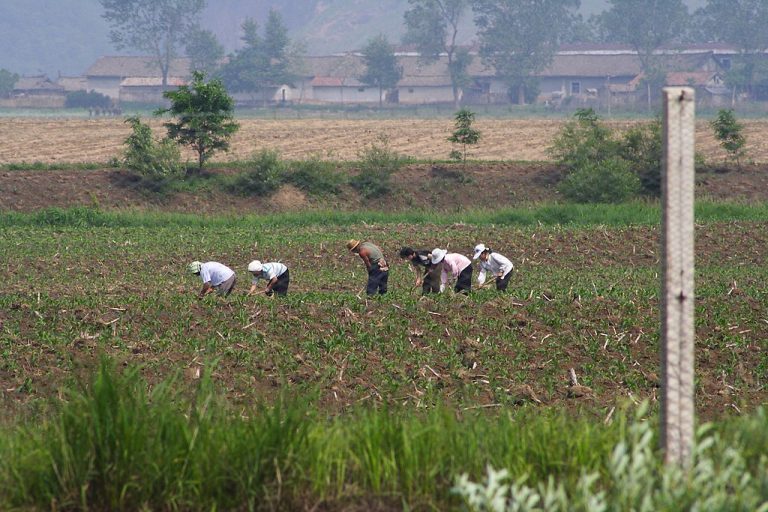
This article was originally published by Radio Free Asia and is reprinted with permission.
North Korea is forcing local organizations and companies to dip into their own coffers to provide equipment and supplies for cooperative farms ahead of harvest season amid projected grain shortfalls, local officials told RFA.
A quarter century after famine killed as many as a tenth of North Korea’s 23 million people, the food situation in North Korea is again dire, with starvation deaths reported in the wake of the closure of the Sino-Korean border and suspension of trade with China in Jan. 2020 to prevent the spread of COVID-19.
In addition to heavy rains in summer that caused severe flooding and destroyed crops in some areas, output at many farms is reduced by a lack of equipment and materials, a result of the long closure of the border with China.
The UN’s Food and Agriculture Organization estimated in a recent report that North Korea would be short about 860,000 tons of food this year, about two months of normal demand.
To help avert crisis ahead of the harvest, the government is ordering factories and firms to donate equipment and supplies, an official in the northeastern province of North Hamgyong told RFA’s Korean Service last week.
“An assignment to provide farming equipment for harvesting and threshing was given to local organizations and companies at the administrative meeting of the party in the city of Chongjin a few days ago,” said the official.
“Company officials are deeply troubled with the assignment, since it is already difficult to keep businesses running due to economic conditions and the coronavirus pandemic,” said the source, who requested anonymity for security reasons.
Suspending trade with China killed off commerce in entire towns, as factories ran out of raw materials and could no longer manufacture finished goods, and trading companies closed up shop.
But now these same factories and companies have been ordered to help out the farms.
“The chief secretary of the city party himself spoke to the audience on the podium at the meeting, saying that the party’s policy has always been to actively support the farming areas. He stressed that there is not much time left until the harvest,” the North Hamgyong source said.
“The list of agricultural equipment needed from each factory and company includes not only small items like shovels, sickles, straw baskets for carrying dirt, grain strings, wood, and nails. It also includes materials like rebar, cement, bearings, machine belts, diesel fuel and lubricants,” said the source.
The companies are not obligated to provide all the items on the list, but they have to offer one or two of the harder to procure items, like the machine belts, fuel and lubricants, according to the source.
“The problem is that the companies usually do not have extra items and therefore they have to buy most of them at the local market, so this is very troubling to the company officials,” the source said.
Prior to the pandemic, companies were able to make money by allowing their workers to pay them not to come to work so they could earn more doing other jobs.
Government provided salaries in North Korea are not enough to make a living, so under a so-called “8.3” scheme, named after a policy rolled out on Aug. 3 decades ago, workers can pay a fee to their companies to let them go make money elsewhere.
In North Hamgyong province, some companies accept payments to let large parts of their workforce go out to sea for the summer to catch squid, according to the source.
“It’s the squid fishing season right now, but the workers are not allowed to go out to sea because of the coronavirus, so no one wants to do 8.3 work. So, the companies have no spare funds at all to buy farming materials,” the source said.
Another North Hamgyong official told RFA that some of the machine factories there have been ordered to manufacture human-powered rice threshers.
“It’s a simple machine where a person can thresh the rice by turning pedals like a bicycle,” said the second source, who requested anonymity to speak freely.
“The government really cares about the large farms in Hwanghae province, which is considered North Korea’s breadbasket, so they more often supply them with machinery, but the farms here in North Hamgyong are rarely ever supplied with machinery and parts, because production levels are very low in comparison,” said the second source.
While most of the farms in North Hamgyong have threshing machines, they are unable to use them because of the frequent power outages and lack of replacement parts, the second source added.
“This is why the farms need the bike-powered threshers, which don’t require electricity. But even the most well equipped machine factories don’t have the parts and materials to make them, so they have to go buy them on their own,” said the second source.
“They have to buy welding rods, iron plates, rebar, bearings, and machine belts to make the bike-thresher, and they need a lot of money to get all of those things on the market, but there are no spare funds this year, so they have to collect money from their employees,” the second source said.
RFA reported last month that North Korea began cracking down on workers who left their employers to go make money in other jobs, even sending them to labor camps.
Also last month, authorities ordered companies and factories to provide grain for pig feed, forcing some companies to collect grain or mash from their employees.
Companies and factories and their workers have also been ordered to cultivate crops and provide farm labor, as the country’s leadership has begun touting a strategy of self-reliance in anticipation of what may become one of the most difficult economic challenge since the 1990’s famine.
0 comments :
Post a Comment